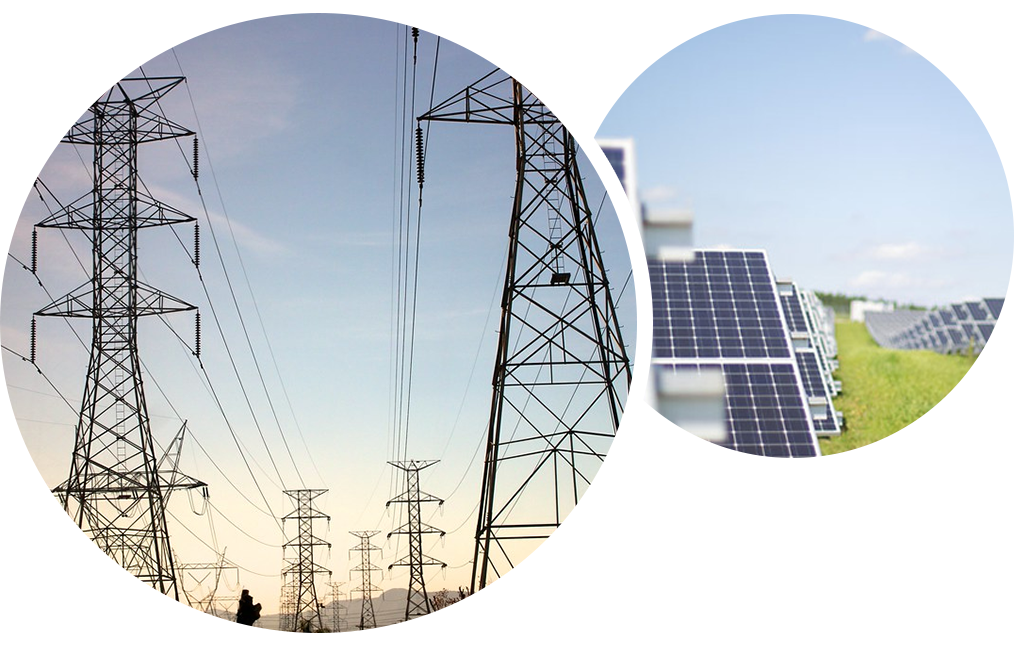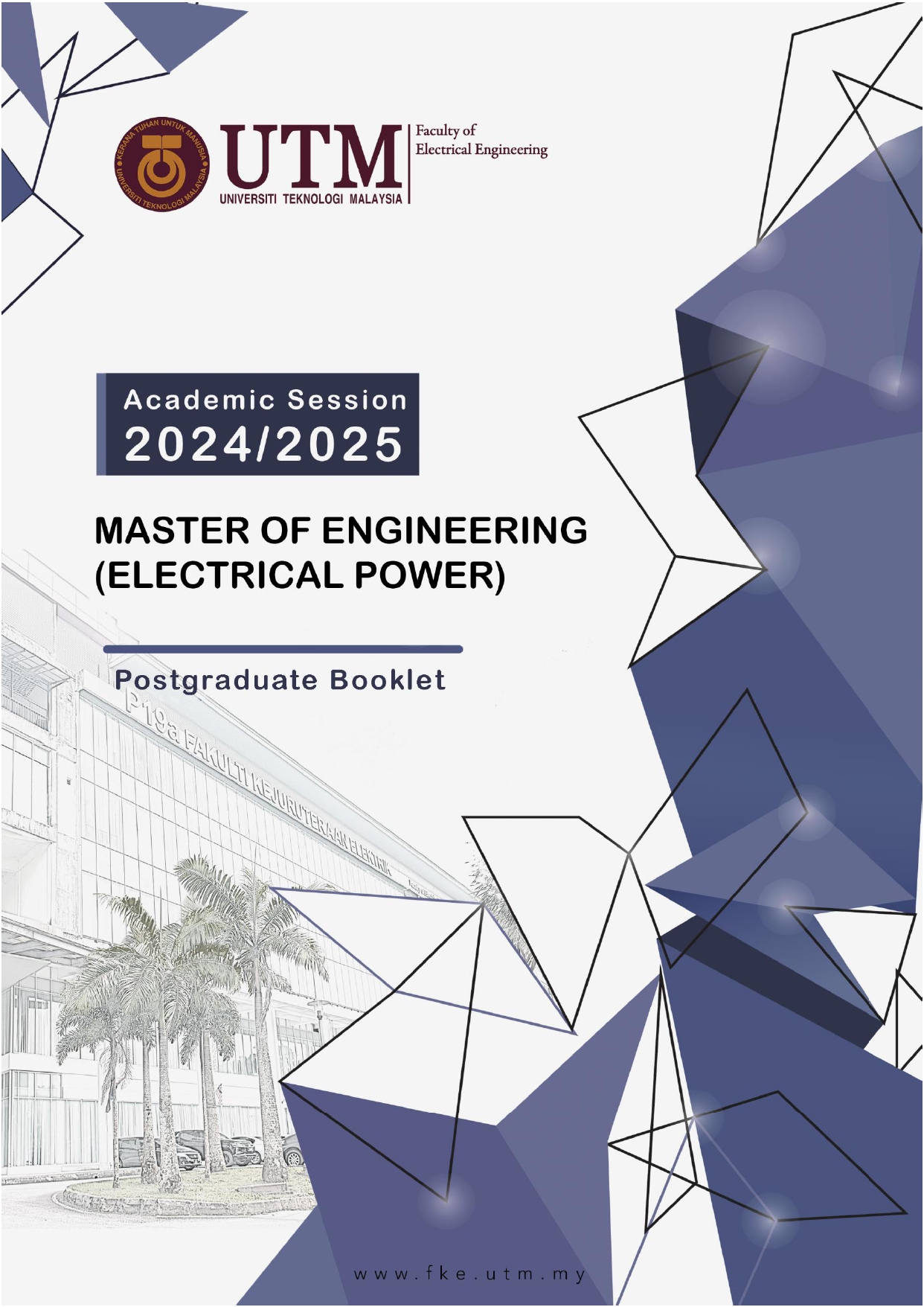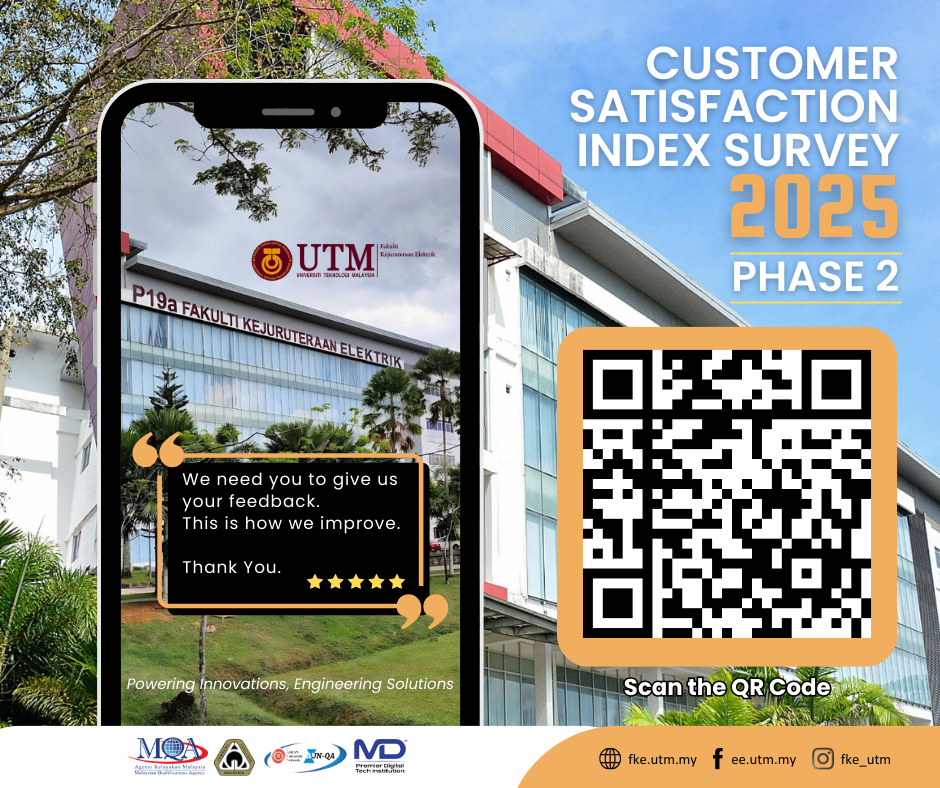Master of Engineering in Electrical Power and Energy (MKEK)
The Master of Engineering in Electrical Power and Energy programme is offered on a full-time, either on campus or off campus (PESISIR). The on-campus programme is offered at UTM Main Campus in Johor Bahru, while the off campus programme is offered at various learning centres throughout Malaysia. The duration of study for the full-time programme is subjected to the student’s entry qualifications and lasts between one (1) year to a maximum of two (4) years. The programme is offered on full-time basis and is based on a 2-Semester per academic session and the short semester. Generally, students are expected to undertake courses equivalent to between fifteen (15) to eighteen (18) credit hours per semester. Assessment is based on coursework and/or final examinations given throughout the semester.
Intake March/October* every year
- Application for February* intake is open from September to November (for international student) and from September to December (for local student).
- Application for October* intake is open from March to June (for international student) and from March to July (for local student).
*Implementation during COVID-19 Pandemic.
This program aims to produce professionals with advanced knowledge and skills in the field of Electrical Power in line with the development of today’s communications technology. The program will also provide exposure in entrepreneurship and sustainability in technology and engineering to further contribute to the generation of talent and transformation leaders according to the current needs of the country.
Career Prospect

Study Mode, Duration and Scheme
| Mode (Full time) | Minimum Duration | Maximum Duration |
| On-campus (at UTM JB) | 1 Years (2 semesters + 1 short semester) | 4 Years (8 Semesters) |
| Off-campus (at UTM JB/KL) | 2 Years (4 Semesters) | 4 Years (8 Semesters) |
| Sem. 1 | Sem. 2 | Sem. 3 |
| Core 1 (1513) | Core 4 (1523) | Elective 2 |
| Core 2 (1423) | Core 5 (1313) | Elective 3 |
| Core 3 (1433) | Elective 1 | Free Elective |
| University Elective | Research Methodology | Project (Part 2) |
| Project (Part 1) | ||
| (12 credits) | (16 credits) | (15 credits) |
| Sem. 1 (October) | Sem. 2 | Short Semester |
| Core 1 (MEEU 1013) |
University General Course (UHAX XXX3) | Research Project Report (MEEP 1826) |
| Core 2 (MEEP 1603) |
Core 5 (MEEP 1573) |
|
| Core 3 (MEEP 1583) |
Core 6 (MEEP 1633) |
|
| Core 4 (MEEP 1503) |
Core 7 (MEEP 1533) |
|
| Elective 1 | Research Project Proposal (MEEP 1814) | |
| Elective 2 | ||
| Elective Courses offered in Sem. 1 MEEP 1593 MEEP 1543 MEEP 1563 MEEP 1673 MEEP 1683 |
Elective Courses offered in Sem. 2 MEEP 1523 MEEP 1613 MEEP 1623 MEEP 1643 MEEP 1653 |
|
| (18 credits) | (19 credits) | (6 credits) |
| Sem. 1 | Short Semester | Sem. 2 |
| University General Course (UHAX XXX3) |
Core 4 (MEEU 1013) |
Core 5 (MEEP 1603) |
| Core 1 (MEEP 1573) |
Research Project Proposal (MEEP 1814) |
Core 6 (MEEP 1583) |
| Core 2 (MEEP 1633) |
Core 7 (MEEP 1503) |
|
| Core 3 (MEEP 1533) |
Elective 3 | |
| Elective 1 | Research Project Report (MEEP 1826) |
|
| Elective 2 | ||
| Elective Courses offered in Sem. 1 MEEP 1523 MEEP 1613 MEEP 1623 MEEP 1643 MEEP 1653 |
Elective Courses offered in Sem. 2 MEEP 1593 MEEP 1543 MEEP 1563 MEEP 1673 MEEP 1683 |
|
| (18 credits) | (7 credits) | (18 credits) |
Program Educational Objective (PEO)
PEO 1: Mastery of knowledge and competency in advanced areas of Electrical Power engineering field.
PEO 2: Practice professionalism and high standards of ethical conducts within organization and society.
PEO 3: Responsive to changing situations by continuously acquiring new knowledge and skills.
Program Learning Outcome (PLO)
At the end of this programme, graduates from this program are expected to have the
following outcomes:
PLO 1: Synthesize complex information, specialized concepts, theories, methods and practice independently in the field of Electrical Power Engineering.
PLO 2: Solve complex problems critically and integratively using systematic approaches.
PLO 3: Apply practical skills to solve problems in the field of Electrical Power Engineering.
PLO 4: Demonstrate effective collaboration with stakeholders professionally.
PLO 5: Communicate effectively the knowledge, skills and ideas using appropriate methods to peers, experts and communities.
PLO 6: Use digital technologies and appropriate softwares competently to enhance study, research and practice.
PLO 7: Evaluate numerical and graphical data critically using quantitative or qualitative tools in solving problems.
PLO 8 : Demonstrate leadership, autonomy and responsibility in managing resources.
PLO 9 : Engage self-advancement through continuous learning or professional development.
PLO 10 : Initiate entrepreneurial projects supported by relevant knowledge and skills
PLO 11 : Demonstrate respectable ethical conducts and professionalism skills in an organization and society.
Curriculum Structure (43 credits)
Seven (7) compulsory courses (21 credits)
| MEEP1503 | Engineering Project Management |
| MEEP1533 | Power Electronic Systems |
| MEEP1583 | High Voltage And Electrical Insulation |
| MEEP1603 | Power System Analysis And Computational Methods |
| MEEP1633 | Power System Apparatuses And Devices |
| MEEP1573 | Intelligent Engineering Solutions |
| MEEU 1013 | Introduction to Research Methodology in Electrical Engineering |
Three(3) elective courses (9 credits)
| MEEP1523 | Electrical Drives |
| MEEP1543 | Advanced High Voltage Technology |
| MEEP1563 | Power Quality |
| MEEP1593 | Power Electronics Applications |
| MEEP1613 | Advanced Power System Control |
| MEEP1623 | Power System Security And Deregulated Market |
| MEEP1643 | Lightning Protection And Grounding System |
| MEEP1653 | Integrated Resource Planning in Energy Sector |
| MEEP1663 | Special Topic in Electrical Engineering |
| MEEP1673 | Power System Protection |
| MEEP1683 | Alternative Energy Systems and Technologies |
Two(2) parts of master dissertation course (10 credits)
| MEEP 1814 | Research Project Proposal |
| MEEP 1826 | Research Project Report |
One (1) university elective course (3 credits)
| UHAX XXX3 | (to choose from the list given by School of Graduate Studies) |
Please refer to the course synopses page for course description.
Entry Requirement*
The admission requirements for students entering the Taught Course program are as follows:
Candidates who meet the requirements of (ii – vi) are required to take and pass the prerequisite courses determined by the Faculty with a minimum grade of (B-).
Detail of UTM admission requirements for International student candidates can be found here, whilst here for Malaysian.
*An international student candidate is required to have a minimum qualification of the TOEFL of 550 or IELTS of band 6.
Contact Us
CONTACT US:
MEEP Programme Coordinator
Postgraduate Studies
Faculty of Electrical Engineering
Universiti Teknologi Malaysia
81310 UTM Johor Bahru
E-mail: penyelarasmeep@fke.utm.my

MEEP Booklet


